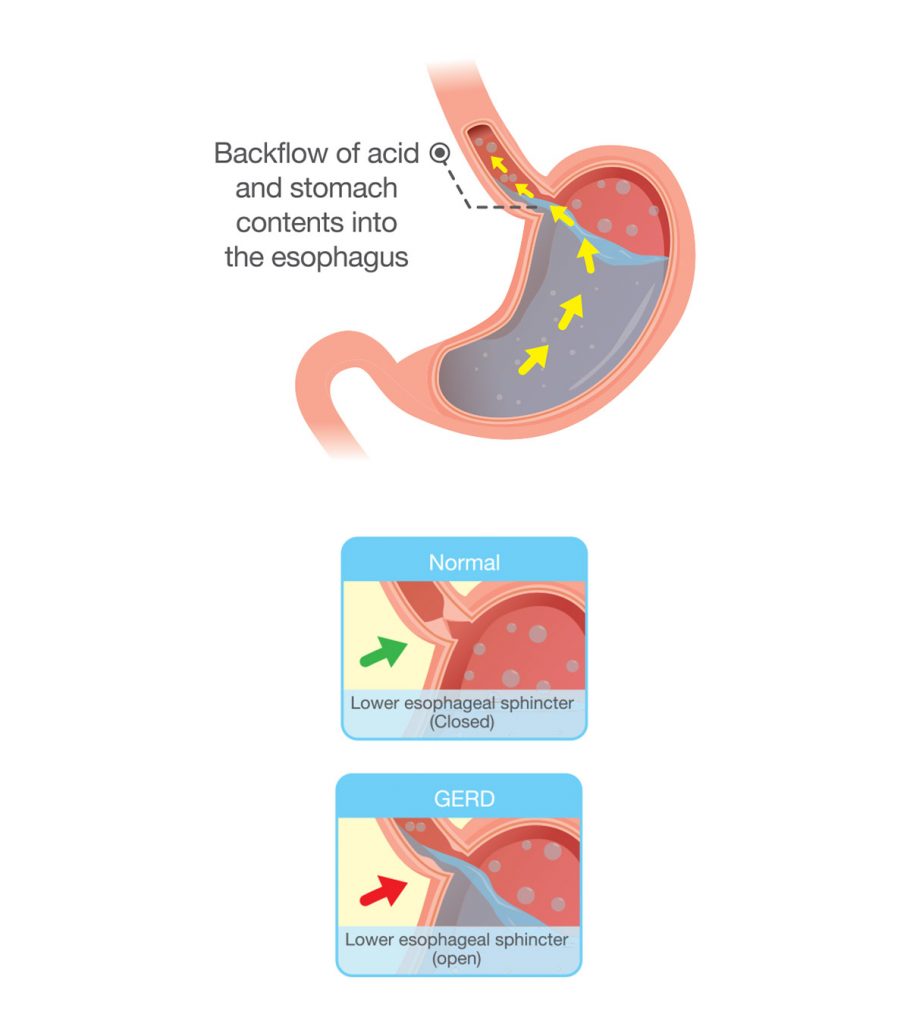Feeding infants will help them grow better, but overfeeding them might increase the chances of causing acid reflux in babies. Acid reflux or gastroesophageal reflux can cause severe discomfort to the baby and may also become chronic, leading to gastroesophageal reflux disease. Therefore, it is important to feed babies milk and other food items in the correct amounts to avoid regurgitation or spit up and keep them healthy.
Read on to know more about overfeeding babies, how it might cause certain problems, and ways to avoid it.
What Is Reflux In Babies?
Acid reflux is the abnormal backflow of acid from the stomach to the esophagus through the lower esophageal sphincter. The sphincter is a muscular valve that prevents stomach contents from flowing into the esophagus. Some infants have a poorly-developed sphincter that opens abnormally which leads to a reflux of stomach acid.
Acid is caustic, and it stings and irritates the inner lining of the esophagus. Since the condition is caused by the malfunction of the esophageal valve, it is referred to as gastroesophageal reflux (GER) or acid reflux or just reflux (1). If the problem persists, then it is called gastroesophageal reflux disease (GERD) (2).
Premature babies also suffer from GER as they have a poorly developed oesophageal valve (3). Reflux is quite common in full-term infants and some experts state that at least one in five infants experience GER at some point. Nevertheless, the American Academy of Paediatrics (AAP) states that GER in infants is normal and should not be a reason for worry (4). It generally settles down by 6-9 months of age. A meta-analysis done by multiple institutions found that GERD symptoms are prevalent in only 10% of children over 18 months on a weekly basis.
What Causes Acid Reflux In Babies?
As you now know, reflux is caused by the abnormal opening of the lower esophageal sphincter. It is the fundamental cause for GER, and certain conditions trigger the abnormal opening.
- Overfeeding the baby generally milk – whether formula or breast milk as well as semi solids.
- Older infants eat different kinds of food and some may cause reflux. For instance, chocolate, peppermint, and high-fat foods cause the sphincter to stay open for longer while tomatoes and citrus foods stimulate the stomach to produce more acid. Both such foods cause reflux.
- Some congenital physical problems make the baby prone to GER. If the baby’s sphincter is slightly weak, it can cause reflux. Physical anomalies include problems in the angle at which the esophagus is attached to the stomach, diaphragm pressing against the stomach, or a herniaiXA condition in which an organ protrudes out by pushing into the tissue or muscle (a weak spot) surrounding it.(5).
- Medication and external factors such as allergies may cause GER. Smoke from pollution and tobacco may also affect the sphincter valve (6).
Once you know the cause, it is important to learn the ways to spot the condition.
How Do You Know If Your Baby Has Acid Reflux?
An infant with reflux will show the following symptoms of GER (7).
- Babies react to esophageal irritation by coughing and gagging, which is likely after a feed when the baby’s stomach is full.
- When the baby spits out some liquid, or food contents, while burping, it is called wet burps.
- Just like wet burps, wet hiccups bring a small quantity of liquid into the mouth from the stomach.
- The baby tends to bring out the milk in the form of a small vomit after breastfeeding or bottle-feeding.
- The moment you finish feeding breastmilk or formula, the little one becomes irritable, fussy, and a bit cranky.
- Gulping feels painful due to the reflux, and the infant may stop several times during the feed due to such feeding difficulties.
- The baby may have frequent chest infections due to the reflux getting into the airway passages.
- Due to frequent vomiting the baby does not gain weight.
The above symptoms indicate normal levels of reflux. In mild reflux, the stomach acids may not reach the mouth and the baby will have no wet burps and respiratory problems such as hiccups, and coughing. Such reflux is unnoticeable and aptly called silent reflux(8). However, the baby will continue showing symptoms such as irritability that can point towards acid reflux.
In a case of severe reflux, the baby shows the below symptoms of GER.
- The baby has coliciXPeriodic and predictable crying episodes in infants for an extended period with no definitive cause.for over three hours a day but is otherwise healthy. Crying usually begins after feeding.
- If surplus acid flows into the esophagus, it can burn the inner lining of the stomach, leading to severe stomach ache and heartburn.
- The baby has heavy breathing with a wheezing sound. It is an indicator that the infant’s airways are constricted, maybe due to reflux fluids trickling into the windpipe.
Sarah, a mother of two, describes the symptoms of her nine-month-old son, who was dealing with silent reflux. She explains, “He (her son) was in a lot of pain, his tummy felt very solid, he did not feed great, he smelled of acid, burped a lot, and had bad hiccups that lasted for hours. He also had a specific cry you can only recognize once you’ve heard it (i).”
The AAP states that in normal reflux, the baby neither cries nor is in pain (9). GER seldom causes acute problems, but it is good to know about them.
When To See A Doctor?
Rush your baby to the doctor right away to receive medical treatment if you notice the following symptoms:
- Vomiting
- Diarrhea
- Poor weight gain
- Poor appetite
- Breathlessness
- Wet burps/hiccups containing blood
These symptoms aid in the diagnostic process.
How Is Acid Reflux In Babies Diagnosed?
Generally the diagnosis of reflux is clinical. The clinical history and examination help in coming to a conclusion. In very rare cases, invasive investigations are needed.
The doctor might use one of these methods to check for acid reflux (10).
- The pH test or acidity levels of the esophagus indicate the presence of acid in the food pipe. The doctor uses a thin endoscopic probe inserted into the esophagus through the nose to detect the acidity levels.
- Chest X-ray verifies if liquids from stomach have passed into the lungs through the trachea. This is especially conducted if the baby is breathless.
- An endoscopyiXA diagnostic method where a thin tube (with a camera) is inserted down the throat to check for underlying digestive disorders.helps assess the esophagus for anomalies. Specialized endoscopes can evaluate the strength of the lower esophageal sphincter and determine if the valve is weak or not.
- Gastrointestinal tests are conducted in the case of more complicated gastrointestinal (GI) problems. One test is the barium test where the baby is given a liquid with barium, which makes the stomach and esophagus distinctly visible in an X-ray. Other tests track the passage of the liquid from the stomach to the intestines. Delayed emptying of stomach contents into the intestine can cause a full stomach to throw the food back into the esophagus leading to reflux.
A confirmed diagnosis of GER helps the pediatrician cure the condition appropriately.
How To Treat Acid Reflux In Babies?
In the majority of the cases, simple measures suffice. After the feed, keep the baby in an upright position for the burp. While feeding the baby, keep the head of the baby slightly higher. Generally, the baby should not lie flat but should lie such that the head is at an angle of 45 degrees to the body, and sleeps sideways. This is effective in managing the majority of the reflux. This needs to be done 24 hours. In 4-6 months the reflux gets better.
The treatment of acid reflux involves the following medications and procedures:
- Oral medicines: The doctor will prescribe medicines such as histamine-2 blockers that ease the production of acid in the stomach. Another category of medicines are proton-pump inhibitors that also reduce acid production by the stomach.These medicines are available over-the-counter.
The baby could even be given medicines, such as metoclopramide (brand name Reglan) to digest the food faster and thus empty the stomach soon. It is taken before feeding or meals, and the dosage is decided by the doctor.
- Surgery: This is done in rare cases. It is only performed on the infant as a last resort when no medicine works (11). The surgical procedure is called fundoplication, and the doctor recommends it when the baby’s reflux leads to severe breathlessness and loss of appetite.
The above treatment procedures provide relief from the acid reflux. The doctor will also suggest changes in the food and feeding style to handle the condition better.
Diet Management In The Case Of Acid Reflux
Proper diet care at home will support the treatment for acid reflux and helps the baby come out of the problem sooner than later:
- Switch baby formulas by trying different ones to see if it brings relief from reflux due to formula intolerance. There are special formulas available in the market known as Anti Reflux (AR) formulas which are given to babies with reflux till they tide over the reflux period (i.e till the weak sphincters regain their tone). Generally the reflux issue resolves.
- Bring changes in the diet for better nutrition as infants tend to lose interest in food due to reflux, which adversely affects their appetite. Modifying the baby’s diet will help the little one gain adequate calories for growth and development. Once the baby assumes weaning age, introduction of semi solid solid food, slightly thickened liquid diet can resolve the reflux , as the thickened feeds stay in the stomach for a longer time. Parents can include rice cereal in the baby’s formula to provide extra carbohydrates. Rice is gentle on the stomach and digests easily. Doctors can prescribe a special high-calorie baby formula and it can be given even to breastfed infants who have inadequate calorie intake that cannot be replenished by breastmilk alone.
- If the baby suffers from an extreme case of reflux, then he will throw up anything he swallows. In such cases, the formula can be fed through nasogastric tube feedings at a hospital. This indeed is very rare.
Most cases of reflux resolve with basic changes in posture, diet changes, etc., or oral medicines and surgery while invasive feeding procedures are not usually required. Complex reflux should be dealt with importance and care because if left untreated it can lead to complications.
Complications Of Acid Reflux In Babies
An untreated severe acid reflux can eventually lead to the following problems.
- Gastroesophageal reflux disease (GERD) is a persistent condition. The baby will have acute symptoms that do not subside easily. Or the baby does not put on weight. Treatment with elaborate procedures such as surgery may be needed to cure the condition.
- Esophagitis is the repeated flow of acid that damages the inner lining of the esophagus making it red and swollen (12). leads to severe discomfort when food passes through the food pipe.
- The liquid stomach contents may spill out from the esophagus and fall into the trachea (windpipe).This may lead to repeated lung infections and wheezing.
- The baby’s diet is affected by reflux, and could lead to weight loss. Babies with severe reflux gain height and weight at a slower pace than others. They could have poor immunity too.
Normal reflux does not lead to grave consequences. However, parents may feel tempted to try some home remedies.
Are Natural Remedies For Acid Reflux Safe?
Infants are different from adults, so never give a baby acid reflux medicines such as antacids or digestive pills. You could resort to homeopathy, but only after consulting a pediatrician (13). AAP recommends against the use of any “special” sleep surfaces and beds for the baby as they do not have any real benefits (14).
Do Babies Outgrow Acid Reflux?
Yes, an infant with GER will outgrow the condition by the age of 12 months. Only 1% of infants with GER continue to show persistent symptoms of acid reflux beyond a year (15).
That said, it is important to know how GER can be prevented.
How To Prevent Reflux In Babies?
Here are some things you can do for the baby to keep reflux at bay:
- Give your baby smaller feeds/meals: Instead of stuffing the baby all at once, give multiple small meals in a day, as they are easy on the digestive system and tend to empty the stomach faster. This prevents overfeeding and thus acid reflux. If it is a breastfed baby, then you can nurse the baby for a lesser duration but at frequent intervals.
- Avoid certain foods: If the infant eats solids, then keep foods such as fatty foods, chocolates, citrus fruits, and tomatoes off the diet. These foods exacerbate the stomach acid production, leading to a higher risk of reflux.
- Buy a suitable bottle: Each baby has a different mouth structure, and not all bottle nipples may work. A good nipple and mouth alignment ensure the baby does not ingest air while feeding. Air is lighter and can force its way out from the stomach through the lower esophageal sphincter causing reflux with wet burps. To avoid this, try different bottles to zero in on the best one.
- Burp the baby between feeds: With a good burping technique, give the baby time to burp and release air, as it prevents the buildup of pressure in the stomach. You can hold him in your arms and pat his back gently.
- Do not lay the baby down immediately after a meal: Hold the baby in a sitting or upright position for 30 minutes after feeding. This helps settle the food in the stomach and prevents it from moving upwards. If the baby eats solid foods, then give him a meal at least three hours before bedtime, as it aids in digestion. A baby should always be placed on his back when sleeping, even with reflux as it is the safest sleep position for infants.
Acid reflux in babies usually does not cause any concerns, and they recover from it by themselves. Babies who go through acid reflux might be called ‘happy spitters’ as they are comfortable with this condition and do not face any discomfort. With the help of some dietary changes and proper medications, your baby will be able to deal with the symptoms and recover quickly. However, if you notice an increase in the severity of the symptoms or signs of vomiting and poor appetite, consult a pediatrician for a proper diagnosis.
Key Pointers
- Acid reflux occurs in babies when stomach acid flows back into the esophagus.
- Possible causes of acid reflux in babies include overfeeding, specific meals, health issues, and medications.
- Symptoms of acid reflux in infants may include coughing, gagging, wet burps, irritability, fussiness, and difficulty swallowing.
- Preventing acid reflux in babies involves avoiding overfeeding, changing feeding positions, and avoiding certain foods.
- Dietary changes, thickened diet, altered feeding positions, and medications may help relieve acid reflux in babies.
- It is important to consult a doctor before trying any remedy or treatment for baby acid reflux.
In this video, discover easy ways to help your baby with reflux. Find out how to minimize spit-up by keeping your little one upright and avoiding snug outfits.















